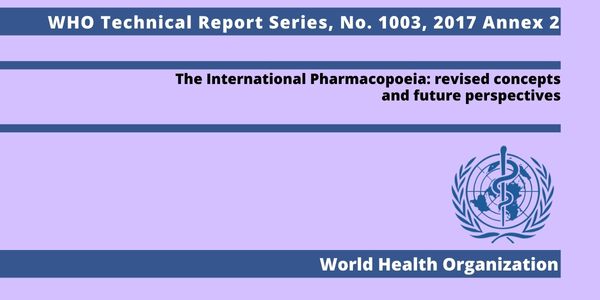The International Pharmacopoeia: revised concepts and future perspectives
General context and overview
WHO Constitution and World Health Assembly:
The quality of pharmaceuticals has been a concern of the World Health Organization (WHO) since its inception. The setting of global standards is requested in Article 2 of the WHO Constitution, which cites as one of the Organization’s functions that it should “develop, establish and promote international standards with respect to food, biological, pharmaceutical and similar products”. The World Health Assembly has adopted many resolutions requesting the Organization to develop international standards, recommendations and instruments to assure the quality of medicines, whether produced and traded nationally or internationally. In addition, many national governments financially support the activities of WHO collaborating centres.
Expert Committee and activities related to The International Pharmacopoeia In response to the World Health Assembly resolutions, the WHO Expert Committee on Specifications for Pharmaceutical Preparations, which was originally established to prepare The International Pharmacopoeia (Ph.Int.), has made numerous recommendations relevant to quality assurance and quality control of medicines.
The activities related to Ph.Int. are an essential element in overall quality control of pharmaceuticals, contributing to the safety and efficacy of medicines. In contrast to other pharmacopoeias, priority has been given for many years to medicines included in the WHO Model List of Essential Medicines, to those important for WHO health programmes and to those that are not included in other pharmacopoeias, e.g. new antimalarials. Since the inception of the WHO Prequalification of Medicines Team (PQT) in 2001 the Ph.Int. workplans also focus on medicines that are included in the PQT’s invitations to submit an Expression of Interest for product evaluation. These first focused on antiretrovirals and medicines used in the treatment of human immunodeficiency virus/acquired immunodeficiency syndrome (HIV/AIDS), tuberculosis (TB) and malaria, and were later expanded to other groups of products.
The quality control specifications published in the Ph.Int. are developed independently in accordance with an international consultative procedure. The official procedure for the development of monographs and other texts for The International Pharmacopoeia was developed and adopted by the Expert Committee on Specifications for Pharmaceutical Preparations and is updated regularly. The policy is to use state-of-the-art analytical procedures. However, the needs of developing countries are taken into account and, whenever possible, simpler, appropriate alternative methods are also included. The Ph.Int. undoubtedly strengthens the scientific credibility of WHO.
Click on the following link for complete guidelines: pdf
WHO TRS (Technical Report Series) 1003, 2017 Annex 2:



